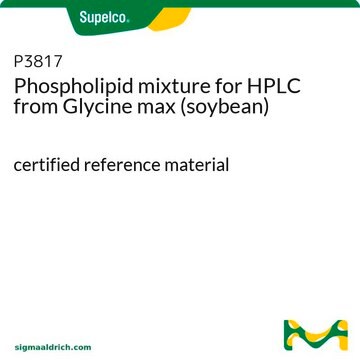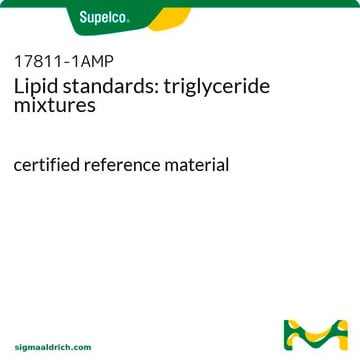11145
Soy Phospholipids
mixture of phospholipids
Synonym(s):
Soy Lecithin, Soybean Phospholipids
Sign Into View Organizational & Contract Pricing
All Photos(1)
About This Item
UNSPSC Code:
12352204
NACRES:
NA.32
Recommended Products
form
powder or granules
concentration
≥20% (phosphatidyl choline, TLC)
impurities
≤3% water
~25% phosphatidylcholine
storage temp.
2-8°C
Related Categories
General description
Asolectin comprises roughly equal proportions of lecithin, cephalin and phosphatidylinositol along with minor amounts of other phospholipids and polar lipids. Good source of fatty acids: about 24% saturated fatty acids, 14% mono-unsaturated and 62% poly-unsaturated fatty acids. For the reconstitution of vesicles in membrane studies; review about the swelling of soybean phospholipids in water and their function as oil-in-water emulsifiers.
Application
Soy Phospholipids has been used:
- to prepare liposomes to load for viscosupplementation testing
- to prepare soy lecithin (SL)-based extenders and assess its potential as a viable alternative to be used in buck sperm freezing media
- to prepare liposome for the liposome co-sedimentation assay
Biochem/physiol Actions
Soy Phospholipids are potentially used as biologically active food additives. These lipids exhibit several biochemical and physical effects that might be useful to prevent pathogenesis. Soy phospholipids are known to lower lipid levels, regulate cholesterol and triglyceride levels, stabilize membrane functions, and support hepatic functions.
Storage Class Code
11 - Combustible Solids
WGK
WGK 3
Flash Point(F)
Not applicable
Flash Point(C)
Not applicable
Personal Protective Equipment
dust mask type N95 (US), Eyeshields, Gloves
Certificates of Analysis (COA)
Search for Certificates of Analysis (COA) by entering the products Lot/Batch Number. Lot and Batch Numbers can be found on a product’s label following the words ‘Lot’ or ‘Batch’.
Already Own This Product?
Find documentation for the products that you have recently purchased in the Document Library.
Customers Also Viewed
Insights on the Quest for the Structure-Function Relationship of the Mitochondrial Pyruvate Carrier.
José Edwin Neciosup Quesñay et al.
Biology, 9(11) (2020-11-25)
The molecular identity of the mitochondrial pyruvate carrier (MPC) was presented in 2012, forty years after the active transport of cytosolic pyruvate into the mitochondrial matrix was first demonstrated. An impressive amount of in vivo and in vitro studies has
Risheng Wei et al.
Cell research, 26(9), 977-994 (2016-08-31)
Ryanodine receptors (RyRs) are a class of giant ion channels with molecular mass over 2.2 mega-Daltons. These channels mediate calcium signaling in a variety of cells. Since more than 80% of the RyR protein is folded into the cytoplasmic assembly
A new insight into more effective viscosupplementation based on the synergy of hyaluronic acid and phospholipids for cartilage friction reduction
Hilvser P, et al.
Biotribology, 25, 100166-100166 (2021)
L. Rydhag et al.
Scand. Symp. Lipids (R. Marcuse, ed.), 90-90 (1982)
M F Isambert et al.
Biochimie, 63(3), 211-219 (1981-03-01)
The ATP-dependent catecholamine uptake system of chromaffin granule membrane has been solubilized and reconstituted in phospholipidic vesicles. The activity of the vesicles implies that both the ATP-dependent H+-translocase and the noradrenaline carrier have been successfully reconstituted. The membrane was solubilized
Our team of scientists has experience in all areas of research including Life Science, Material Science, Chemical Synthesis, Chromatography, Analytical and many others.
Contact Technical Service






